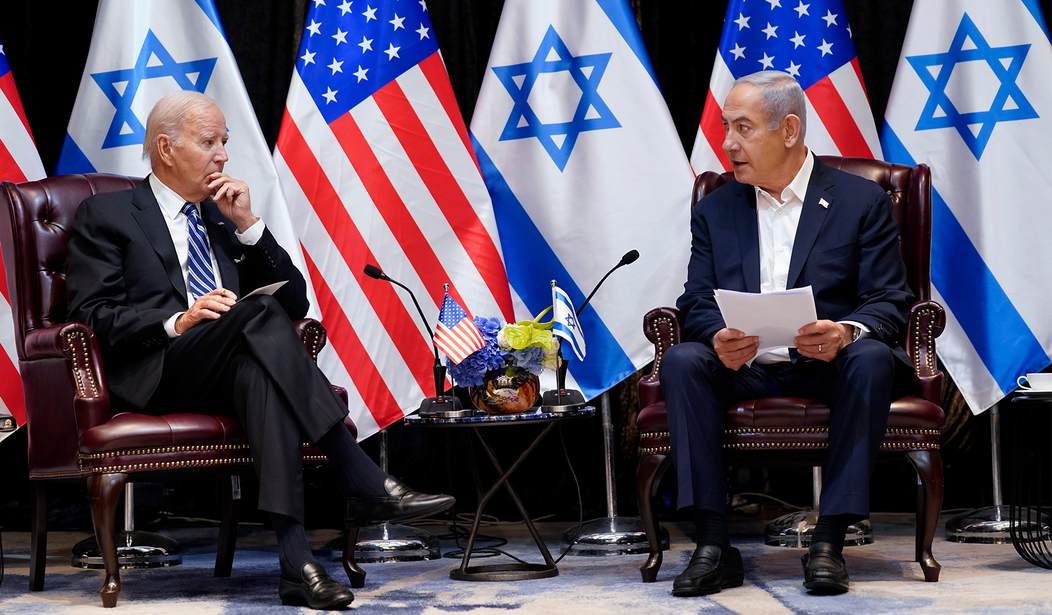Since taking office early in 2021, President Joe Biden frequently has used the term “inflection point” as a way to add gravitas to whatever issue he is speaking about. In fact, he has used it so often its meaning, or whatever it is supposed to mean, has been significantly diluted. His current visit to Israel, however, which neither Biden nor his media team has described as an “inflection point,” could accurately be seen as such a juncture for Biden and for the Middle East.
In none of the instances in which Biden has employed such rhetoric has he explained exactly what he means by the use of the term. In such linguistic laxity, the president perhaps presumes the reader or listener knows that the term “inflection point” (when not used in its technical, differential geometry context) is defined by dictionary guru Merriam-Webster, as “a moment when significant change occurs or may occur.”
In his October 15th “60 Minutes” interview with Scott Pelley, Biden declared that his principal motivation for seeking a second term despite his advanced age and the myriad domestic problems he continues to face, was because “[t]h world is at an inflection point.” Two days later, America’s commander-in-chief was en route to Tel Aviv – smack dab in the middle of a burgeoning and already extremely bloody war between our close ally Israel and Hamas, one of that country’s most militant adversaries.
What takes place in that region over the coming days, weeks, and months, may very well turn out to be a point at which “significant change occurs.”
By all public assessments, the Jewish State is poised to launch a ground attack against Hamas, whose base of operations is Gaza, the narrow and densely populated quasi-state that lies between Israel and Egypt on the Mediterranean coast.
If Israel in fact engages in a massive military invasion of Gaza, the goal of which would be to neutralize Hamas’ ability to launch future cross-border terror operations such as that on October 7th which resulted in dozens of hostages being taken into Gaza (including several U.S. citizens), the declared “war” between Hamas and the IDF (Israel Defense Forces) would almost certainly expand, probably dramatically.
Recommended
In this context, the potential stakes of Biden’s wartime diplomacy could not be greater.
If Biden succeeds in convincing Israeli Prime Minister Netanyahu that a massive military invasion of Gaza is neither necessary nor prudent, he will have earned significant kudos by heading off a very dangerous and negative “inflection point.”
If Biden is unsuccessful in heading off a major Israeli invasion (and possible subsequent occupation) of Gaza, the resulting expansion beyond the strict confines of Israel and Gaza -- including possible direct military involvement by other NGOs (e.g., Hezbollah) and state supporters of Palestine, such as Lebanon, Syria, and Iran -- risks hostilities on a scale actually imperiling world peace.
Tuesday's hospital blast in Gaza already has complicated Biden’s mission. His plan to meet with Jordanian and Palestinian leaders in addition to Israel’s was “upended” due to the hospital disaster, thereby potentially and severely limiting the possible benefits of his trip to the region.
Still, if his discussions with Netanyahu, and perhaps indirectly with Arab officials while in Israel, results in visible movement to secure the release of Hamas-held hostages (especially Americans), he can legitimately claim a degree of success. If some form of punishment for the atrocities committed by Hamas in its most recent cross-border operations that are seen as short of a massive Israeli military operation into Gaza, even perhaps with limited, non-combat U.S. involvement, this, too, could enhance his administration’s stature, and might at least to a small but significant degree lessen the chances for a much wider conflict.
Any way you look at this presidential foray to the Middle East, it is a very real, as opposed to a merely rhetorical “inflection point.” It is one that should be supported publicly in a bipartisan way here at home – although in today’s hyper-partisan political climate that may be too much to hope for.
Bob Barr represented Georgia’s Seventh District in the U.S. House of Representatives from 1995 to 2003. He served as the United States Attorney in Atlanta from 1986 to 1990 and was an official with the CIA in the 1970s. He now practices law in Atlanta, Georgia and serves as head of Liberty Guard.
























Join the conversation as a VIP Member